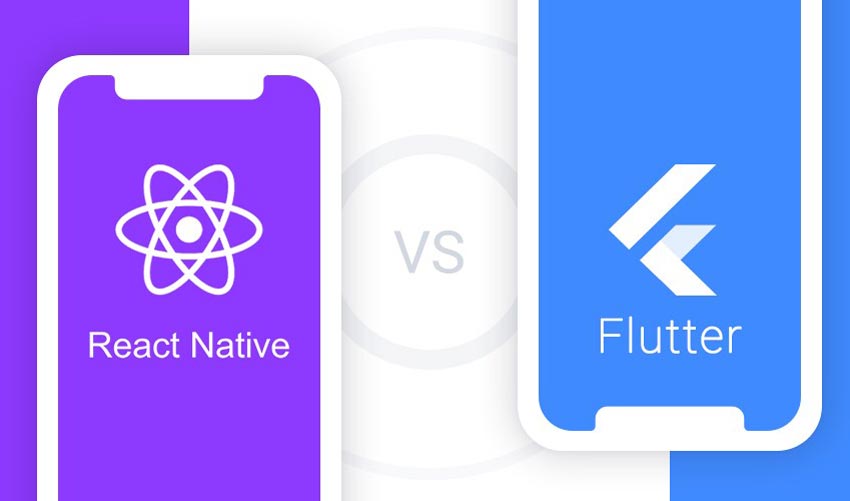React Native is an open-source framework supported by Facebook that was released on GitHub, providing React Native App Development Services that covered how to combine both the native APIs of the iOS and Android platforms. However, Google's Flutter App Development Service is a wider step forward, allowing you to build both Android and iOS highly responsive native apps at the same time.
In this competitive world, the ultimate goal of a mobile app development company is to hire flutter app developers or hire react native app developers according to client’s requirements and needs and choose a cross-platform framework that enables developers to write a single code-base and deploy it across multiple platforms, sharing as much code as possible and thus, ultimately saving time and money. In this way, mobile app development companies assist clients in choosing the right framework that can best support them to achieve their goals.
Flutter is a mobile app SDK (Software Development Kit) produced by Google, providing Flutter App Development Services that allows us to build high-performance, high-fidelity, and extremely fast mobile applications that can run easily on multiple platforms such as Android and iOS with a single codebase. Now, that makes Flutter powerful because it contains a thin layer of C/C++ code, but most of its systems are implemented in Dart (Dart is a general-purpose programming language) that developers can easily read, change, or delete. It provides flutter application developers with great control over the system. Many flutter developers appreciate the flexibility and efficiency of the platform.
React Native App Development has shown great popularity in recent years, mostly from ReactJS and the web community. Being written in JavaScript has increased its adoption rate and many react native app development companies in India & the USA are switching to it. While Flutter App Development has been heavily promoted by Google since 2018 and generated significant interest by developers, it is new to the mobile app development industry and has a long potential to lead in the race.
Quick Comparison Between Flutter vs React Native
You Can Also Read: 5 Effective SEO Techniques To Drive Organic Traffic
Framework Maturity
React Native was first released in 2015, while the first beta release of Flutter was released later in 2018. So, in terms of maturity, Flutter is less mature than React Native. Since it is still in its infancy, it will take some time to mature into a preferred development framework.
Programming Language
React Native uses JavaScript to build cross-platform applications. This makes it extremely easy for new web developers to start their mobile app journey. Contrastingly, Flutter uses a different language i.e., Dart programming language. It uses several object-oriented concepts that are easy to learn and get started with. But, given that JavaScript is a language with which developers begin their journey, the fact that React Native is easy drives it forward.
Configuration and Setup
The initial setup process of Flutter is much easier as compared to React Native. The Flutter Framework offers services such as automatic detection of system problems, something that React Native largely misses out on.
User Interface (UI)
Flutter app development services and their React Native counterparts differ significantly in the building blocks they use for their UI development. While React Native app development services use native Android and iOS modules with the help of third parties or custom components, Flutter works with proprietary widgets that are 100% customized. It makes using Flutter the first choice for developers nowadays because of the customization it provides.
Application Performance
While we speak of Flutter vs React Native in terms of performance comparison, Flutter leads by a huge margin. It is predominantly agile than its React Native development counterpart. Since there is no JavaScript bridge to initiate interaction with the native components of the device, the development speed and running time becomes significantly faster in the case of Flutter.
Stable for development
Stability becomes a vital factor when you are developing cross-platform applications for mobile platforms. Since Flutter app development is fairly new to the cross-platform industry, the number of businesses adopting the SDK to develop their cross-platform apps is very small. On the other hand, the React Native App Development showcase page of apps developed using the framework is much higher. It was already quite stable and is also supported by a large community of development agencies.
Code Reuse
React Native app development services enable you to write a code once and ship it anywhere, accepting platform differences. Meaning, from time to time react native app developers may have to look at what platform they are running on and load a different set of components depending on the platform. Flutter's codebase is much more reusable. This allows one to define a UI widget tree and then reuse the defined logic so as not to discriminate too much. This is why Flutter app development services are preferred in terms of code reusability.
Both React Native App Development Service and Flutter App Development Service have their own set of pros and cons. Flutter App Development is still new in the market of the mobile app development industry and made its debut after React NativeApp Development that has already gained a huge audience in the mobile application development market.
